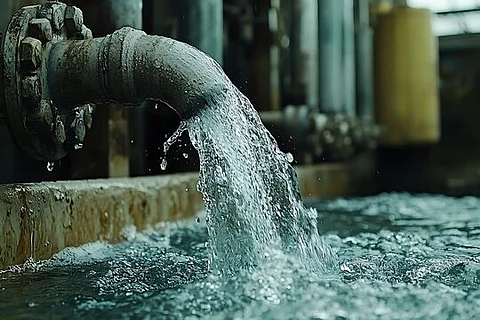
- NEWS
- the EDIT
- COMMENTARY
- BUSINESS
- LIFE
- SHOW
- ACTION
- GLOBAL GOALS
- SNAPS
- DYARYO TIRADA
- MORE

The Water Alliance, composed of businesses that advocate sustainable management of water and sanitation, shared water solutions it has undertaken during the 6th CarbonPH Coalition Session hosted by Aboitiz Equity Ventures (AEV), the portfolio manager of the Aboitiz Group, and Aboitiz Foundation in Makati City on 23 April.
Engr. Albert Samuela, lead trainer at the Water Alliance, presented the water situation in the Philippines and measures to address water security issues during the session at the Aboitiz Tech Space of the Asian Institute of Management.
According to Samuela, the Philippines is the 13th most populous country in the world with more than 113 million people, according to the United Nations and World Bank.
“Larger populations mean higher demand for water and conversion of natural resources and ecosystems that provide water,” he said.
The current Filipino generation’s dilemma is that water resources are under threat as population and demand continue to grow. The country has the lowest per capita allocation of water at 4,491 cubic meters per person per year.
Some 2.7 million Filipino families also still lack access to adequate water supply and sanitation.
In line with its commitment to complement government efforts in solving water security issues, the Water Alliance has provided potable water supply to rural communities and adopted measures to lower water footprint and treat wastewater.
Samuela told participants to the learning session that the Alliance installed a total of 152 water access facilities in areas that are not reached by water service providers or water districts and communities with high incidence of poverty from 2017 to 2023. Such facilities are potable water systems, water sanitations, mobile and portable water treatment systems, handwashing facilities and rainwater harvesting systems. A mobile water filtration system also was deployed to Baybay Water District in Leyte in 2015.
“These water access facilities reached 39 provinces, benefited 6,378 families, and 8,343 students and school personnel,” Samuela said.
The objectives of the projects are to reduce the incidence of water-borne diseases; prevent child malnutrition and stunting; reduce the risk to women and children usually tasked to fetch water; increase time for learning and worthwhile activities; and actively involve communities in managing and sustaining the water system.
To lower water footprint and treat wastewater, the Alliance adopted the Water Demand Management (WDM) approach to optimizing water use.
Under the WDM, about 259 individuals were provided with various sessions and training as of April 2024. These individuals were from 125 companies, organizations, local government units, civil society organization, academe, water service providers, government agency and industries.
Further, the Water Alliance tapped the academe and research institutions in expanding inventory of water-related studies. Availability of water access studies were done by De La Salle University in Mulanay, Quezon; by Ateneo de Manila University in Pandi, Bulacan; and the University of the Philippines-Diliman in San Isidro, Leyte.
Meanwhile, Atty. Ray Thomas Kabigting, assistant director of the DENR’s Forest Management Bureau (FMB), shared updates on forest policies and tools during the session.
Apo Agua Infrastructura general manager Ronnie Lim discussed the impact of the Davao City Bulk Water Supply Project, the largest private bulk water supply facility in the country.
AEV chief reputation and sustainability officer and Aboitiz Foundation president Ginggay Hontiveros-Malvar said the CarbonPH Coalition sessions highlight the importance of collaboration and shared accountability.
“Sustainability is not a solo journey — it is a collective responsibility. The Carbon Coalition is a platform where we align our goals, pool our knowledge, and elevate our actions,” she said.
Hosting the CarbonPH Coalition sessions is part of the Aboitiz Group’s commitment to sustainability and environmental stewardship.
The session also drew participants from AboitizPower, Aboitiz InfraCapital, Aboitiz Land, Ayala/Klima, SM Prime, SM Retail, JG Summit Holdings, LT Group, Shell, BDO, UnionBank, SGV & Co. and GT Capital.
